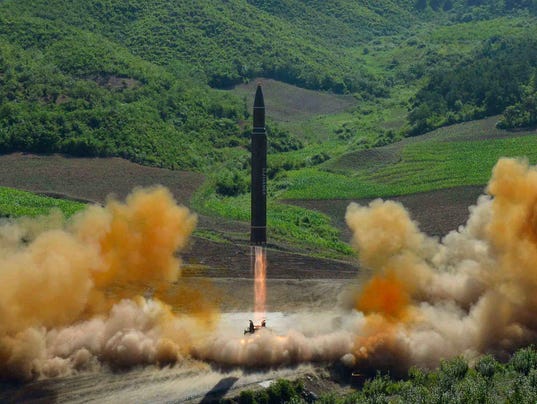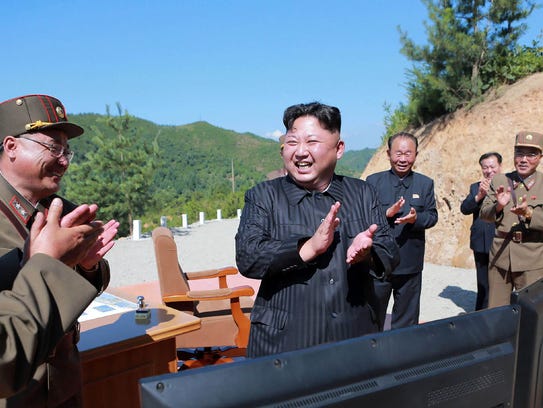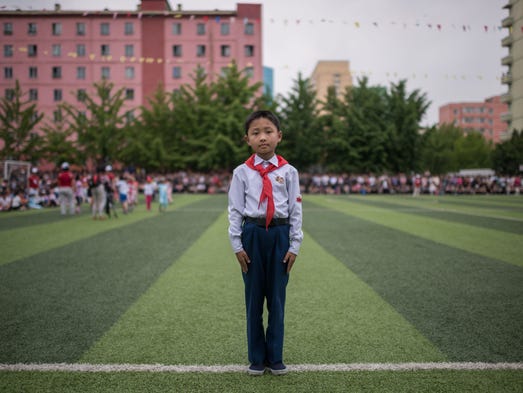Fox News

The Glory Hope 1 is shown in a satellite picture, where it took on illicit North Korean coal. (U.S. photo submitted to the United Nations)
At least six cargo ships linked to China furtively violated U.N. sanctions by taking on North Korean coal late last year, potentially providing a significant boost to the rogue regime's coffers, the U.S. alleges.
The U.N. Security Council in August hit North Korea with sanctions that were projected to cut nearly $1 billion from its annual exports revenue of roughly $3 billion, banning exports of coal, iron ore, and other products.
The move, which China ultimately endorsed, came after the isolated country fired two intercontinental ballistic missiles that raised international tensions.
But the six vessels, which the U.S. tracked by satellite and formally reported to the U.N. as sanctions violators in December, defied the sanctions by bringing North Korean coal to Vietnam, Russia, or other ships in mid-sea transfers, the Wall Street Journal reported, citing U.S. officials.
The paper found that the six ships are either managed or owned by Chinese companies or firms registered in Hong Kong.
The Glory Hope 1 is shown in a satellite picture, where it took on illicit North Korean coal. (U.S. photo submitted to the United Nations)
At least six cargo ships linked to China furtively violated U.N. sanctions by taking on North Korean coal late last year, potentially providing a significant boost to the rogue regime's coffers, the U.S. alleges.
The U.N. Security Council in August hit North Korea with sanctions that were projected to cut nearly $1 billion from its annual exports revenue of roughly $3 billion, banning exports of coal, iron ore, and other products.
The move, which China ultimately endorsed, came after the isolated country fired two intercontinental ballistic missiles that raised international tensions.
But the six vessels, which the U.S. tracked by satellite and formally reported to the U.N. as sanctions violators in December, defied the sanctions by bringing North Korean coal to Vietnam, Russia, or other ships in mid-sea transfers, the Wall Street Journal reported, citing U.S. officials.
The paper found that the six ships are either managed or owned by Chinese companies or firms registered in Hong Kong.
The U.S. also sought to have four other ships that have no apparent connections to China labeled as sanctions violators.
One of the Chinese-linked cargo ships, the Glory Hope 1, began violating the sanctions just days after they were passed in August, U.S. officials said, according to the Wall Street Journal.
The Chinese-owned ship flew a Panamanian flag and turned off its automatic identifying transmitter as it headed into a North Korean port on Aug. 7, the Journal reported.

The Chinese-owned ship Kai Xiang was photographed appearing to load North Korean coal. (U.S. photo)
Meanwhile, the U.S. was watching from above, using spy satellites to observe the ship that officials estimate could hold up to $1.5M worth of black-market coal.
The Glory Hope 1 loitered for an extended period at a Chinese port after arriving from North Korea, U.S. officials told the U.N.
U.S. officials suspect the unusual maneuver was a ruse to make it appear that the crew was taking on Chinese cargo, according to the Wall Street Journal.
All U.N. members would have to ban the Glory Hope 1 and the other five ships from their ports in order to formally designate them as sanctions violators.
China’s foreign ministry told the Journal that it fully complies with U.N. resolutions.
One of the Chinese-linked cargo ships, the Glory Hope 1, began violating the sanctions just days after they were passed in August, U.S. officials said, according to the Wall Street Journal.
The Chinese-owned ship flew a Panamanian flag and turned off its automatic identifying transmitter as it headed into a North Korean port on Aug. 7, the Journal reported.
The Chinese-owned ship Kai Xiang was photographed appearing to load North Korean coal. (U.S. photo)
Meanwhile, the U.S. was watching from above, using spy satellites to observe the ship that officials estimate could hold up to $1.5M worth of black-market coal.
The Glory Hope 1 loitered for an extended period at a Chinese port after arriving from North Korea, U.S. officials told the U.N.
U.S. officials suspect the unusual maneuver was a ruse to make it appear that the crew was taking on Chinese cargo, according to the Wall Street Journal.
All U.N. members would have to ban the Glory Hope 1 and the other five ships from their ports in order to formally designate them as sanctions violators.
China’s foreign ministry told the Journal that it fully complies with U.N. resolutions.
Several of the ship-owners and managers linked to the ships have reportedly been questioned by Chinese authorities.
U.S. National security advisor H.R. McMaster last month threatened harsh consequences for ships that continue to defy the sanctions.
“A company whose ships would engage in that activity ought to be on notice that that might be the last delivery of anything they do for a long time, anywhere,” McMaster said.
U.S. National security advisor H.R. McMaster last month threatened harsh consequences for ships that continue to defy the sanctions.
“A company whose ships would engage in that activity ought to be on notice that that might be the last delivery of anything they do for a long time, anywhere,” McMaster said.




